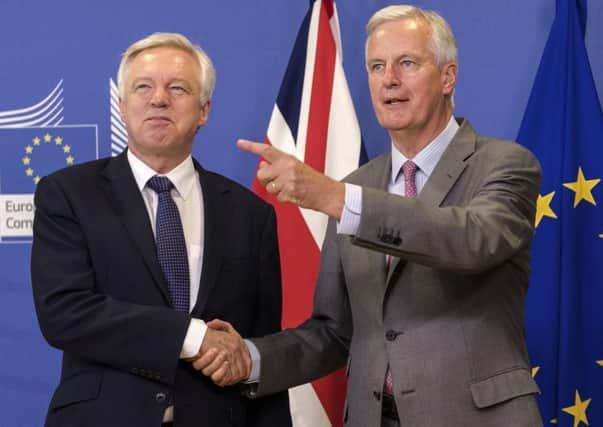Government releases new Brexit papers in hope of early trade talks


Marking the release of the latest round of Government negotiating papers today, the Brexit Secretary David Davis re-issued his appeal for talks with Brussels to progress beyond the terms of the UK’s withdrawal.
His comments follow repeated warnings that discussions about a future relationship could be postponed as officials wrangle over citizens’ rights and the UK’s financial obligations.
Advertisement
Hide AdAdvertisement
Hide AdBut despite welcoming the latest input from the UK side, the EU has indicated it is standing firm on its negotiating timetable .
The Government released two position papers on Monday, with the first outlining plans to preserve the confidentiality of official documents exchanged between the UK and EU, and the second suggesting ways to avoid barriers to trade in goods and services after Brexit.
Key proposals include an agreement that goods which are placed on the market before “exit day” can continue to be sold in the UK and EU, and a guarantee that there will be no restrictions on services which are supplied with goods.
Commenting ahead of the third round of formal negotiations next week, Mr Davis said the documents will help to give businesses and consumers confidence that the UK will continue to enjoy a status as “an economic powerhouse”.
Advertisement
Hide AdAdvertisement
Hide AdBut he claimed the papers also demonstrate that discussions over Britain’s exit from the EU and its future trade relationship with the bloc are “inextricably linked”.
“We have already begun to set out what we would like to see from a future relationship on issues such as customs,” he said. “[We] are ready to begin a formal dialogue on this and other issues.”
The EU’s official negotiating directive states that “sufficient progress” must be made on the first phase of talks – which covers the rights of EU and UK nationals living abroad and any outstanding financial obligations– before talks can move on to the future of trade.
It was suggested at one stage that this point could be reached as early as the autumn, but recent reports suggest disagreements over the financial settlement could push trade talks back until the end of the year, with the Slovenian Prime Minister Miro Cerar stated this weekend that the first phase “will definitely take more time than... expected”.
Advertisement
Hide AdAdvertisement
Hide AdAn EU spokesman cast further doubt on any prospect of fast-tracking the talks when he told reporters that while the position papers were “welcome” there is “a very clear structure in place... about how these talks should be sequenced”. He stressed that this could not be changed without the agreement of the 27 members of the European Council.
“As Michel Barnier has said time and again, we have to have sufficient progress first on the three areas of citizens’ rights, financial settlement and Ireland, and only then can we move forwards to discussing the future relationship,” he said.
“The important thing is to realise that the clock is ticking, that we have no time to lose and that we need to get on with it.”
The European Council is not scheduled to meet again until October 19, after the fifth round of formal Brexit negotiations.